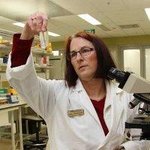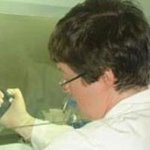On this page
Massey University’s Molecular Epidemiology and Public Health Laboratory (mEpiLab) sits within the Hopkirk Research Institute on the Manawatū campus.
mEpiLab and the EpiCentre form a World Organisation for Animal Health (WOAH) Collaborating Centre for veterinary epidemiology and public health. Their research has improved our understanding of the epidemiology, evolution and control of agents of infectious disease and has contributed to major reductions in the rates of foodborne disease in New Zealand.
What we do
Our mission is to improve the health of New Zealanders. We develop and apply new techniques to inform decision-making and guide the prevention and control of infectious disease.
Our team comprises scientists with expertise in the fields of epidemiology, microbiology, molecular biology, bioinformatics/computational biology, mathematical modelling, veterinary science and public health.
We work closely with collaborators in the Crown Research Institutes, AgResearch, Institute of Environmental Science and Research (ESR), National Institute of Water and Atmospheric Research (NIWA), regional public health units and other groups across Massey University on pathogens such as Campylobacter, Salmonella, E. coli, Leptospira, Cryptosporidium and Giardia.
We develop and apply epidemiological and evolutionary models to understand sources and pathways of human infection and inform control strategies.
Our facilities

Hopkirk Research Institute
- PC2 and PC3 containment laboratories
- A PCR suite – real-time and conventional PCR machines for speciation and multilocus genotyping
- Specialist microbiological culture capability – high-capacity microaerophilic workstations
- Equipment for enumeration of microbes
- Bionumerics software for the storage and analysis of molecular genotyping data
- Storage facilities: -80°C freezers for archived material.
Our projects
Our programme on food safety and zoonoses uses an array of molecular and modelling tools to advance our understanding of the transmission of bacterial pathogens and their biology.
This programme has allowed us to:
- develop new surveillance and disease control tools
- inform national policy for controlling infectious diseases related to food and food production in New Zealand.
Controlling Escherichia coli O157 and other STECs in the food chain
The laboratory provides a key component of the Foundation of Research, Science and Technology (FRST) and Industry-funded Improved Pathogen Control Technologies (IMPACT) programme.
The programme is a collaboration between Environmental Science and Research (ESR), AgResearch and Massey. It is developing new tools for the control of these pathogens, including phage control and quorum sensing.
Researchers are also conducting epidemiological studies at several meat processing plants in both the North and South Islands to further our understanding of the transmission and propagation of these pathogens along the food chain.
Molecular typing, pathogen survival and source attribution for Campylobacter
This programme has advanced our understanding of the epidemiology, evolution and emergence of this pathogen and contributed to the dramatic decline in human cases observed in recent years.
This work involved setting up the Manawatū Sentinel surveillance site in 2005 and the subsequent culture, enumeration and sequencing of Campylobacter from human cases, food sources, farmed and wild animals and recreational water. We developed new risk modelling tools to address the question, "where are humans getting infected from?"
This programme's funding is by the New Zealand Food Safety Authority (NZFSA), Industry, Health Research Council of New Zealand (HRC) and the Royal Society Marsden fund.
Controlling Leptospira infections in meat workers and livestock
The laboratory has unique expertise in the culture and genotyping of these fastidious organisms. A fastidious organism is an organism with particular or complex nutritional requirements.
Our epidemiological studies have been used for:
- the prevention and control of infection in abattoir workers
- evaluating vaccine-based control measures in animal populations.
Surveillance systems for salmonella in humans and animals
This project uses advanced molecular and spatial modelling tools in order to develop and optimise surveillance systems for salmonella in humans and animals.
The team have also developed modular process risk models that capture the propagation of these pathogenic bacteria along the food chain and during the slaughtering process.
Molecular genotyping and infectivity assays for protozoal pathogens such as Cryptosporidium and Giardia
This work includes:
- screening isolates from surface and groundwater, including wastewater from meat processing plants
- assessing catchments used for the supply of drinking and recreational water.
Funding for this work is by the Ministry of Health.
Our staff
The laboratory staff have expertise in veterinary science, microbiology, molecular biology, bioinformatics, statistics and modelling. In addition to this postgraduate and PhD students support our research within Hopkirk Research Institute mEpiLab.

Professor Jackie Benschop
Professor Jackie Benschop is Co-Director of Massey University's Molecular Epidemiology and Public Health Laboratory (mEpiLab), OIE collaborating Centre for Veterinary Epidemiology and Public Health.

Professor David Hayman
Professor Hayman is Co-Director of Massey University's Molecular Epidemiology and Public Health Laboratory (mEpiLab), OIE collaborating Centre for Veterinary Epidemiology and Public Health. He is also a member of the Global Health Security Agenda Consortium (GHSAC).

Professor Patrick Biggs










Dr Ahmed Fayaz




Simon Verschaffelt

Contact us
Please contact Jackie Benschop or David Hayman for any inquiries about mEpiLab.
Email j.benschop@massey.ac.nz
Email d.t.s.hayman@massey.ac.nz
Location
mEpiLab can be found in the Hopkirk Research Institute on Massey University's Manawatū campus.
Hopkirk Research Institute, Massey University Palmerston North
Related content
Infectious Disease Research Centre
Infectious Disease Research Centre
EpiCentre
A World Organisation for Animal Health (WOAH) Collaborating Centre since 2014, providing world-class research, service and teaching in epidemiology, biosecurity and public health.
Master of Veterinary Studies – MVS
Progress your professional development by gaining expertise in a specific area of veterinary science.
Doctor of Philosophy – PhD
A prestigious research qualification that demonstrates your ability to carry out independent and original research in your chosen field.